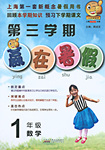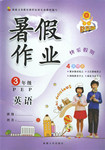题目内容
【题目】假定英语课上老师要求同桌之间交换修改作文,请你修改你同桌写的以下短文。短文中共有10处错误,每句中最多有两处。错误涉及一个单词的增加、删除或修改。
增加:在缺词处加一个漏字符号(∧),并在此符号下面写出该加的词。
删除:把多余的词用斜线(\)划掉。
修改:在错的词下划一横线,并在该词下面写出修改后的词。
注意:1.每处错误及其修改均仅限一词;
2.只允许修改10处,多者(从第11处起)不计分。
I like riding my bike.Though it is not very new,but it is my best friend.I find very convenient to go anywhere with a bike.Riding gives me not only exercises but also pleasure.I use my bike most in summer when the weather is warm and dry.It can be very unpleasant in winter that it is cold and wind is blowing heavily.It can also be very dangerously.Of course I will be very careful in my bike.In fact,accidents are not the only problem.One day I went to school and come back to find the front wheel was missed.Worse still,it was the long walk to the repairer's shop.
【答案】1.去掉but
2.find后加上it
3.exercises—exercise
4.most—mostly
5.that—when/because
6.dangerously—dangerous
7.in—on
8.come—came
9.missed—missing
10.the long—a long
【解析】1.在英文中,though与but不能连用,故将but去掉.
2.句意:我发现骑自行车到一个地方很方便,这里find后缺少一个宾语,可以用形式宾语it代替后面的不定式“to go anywhere with a bike”,故在find后加上it.
3.句意:骑自行车不仅让我锻炼了身体,而且给了我快乐,exercise在表示“锻炼”时,是不可数名词,故将exercises改为exercise.
4.根据句意:在夏天天气温暖干燥的时候,我最常用自行车,可知这里most是用来修饰use的,但只有副词才能修饰动词,故将most变为mostly.
5.根据句意:在冬天特别冷,风刮的特别大的时候,骑自行车是非常不舒服的,可知:这里that后面引导的定语从句修饰winter,但因为先行词winter表示时间,且从句句子结构完整,所以要用关系副词when来引导这一定语从句,其在定语从句中作时间状语;此外,也可以用because来引导原因状语从句,故将that改为when/because.
6.句意:它也可能非常危险,这里be动词后不应该跟副词,应该跟形容词,故将dangerously改为dangerous.
7.on the bike在自行车上,固定搭配,故将in改为on.
8.根据原文中“One day I went to school and come back to find the front wheel was missed.”的and要连接两个并列的动词形式,因为and前是动词的过去时,所以come也要用过去时,故将come改为came.
9.根据句意:返回学校去找丢失的前轮,这里句子中出现了两个谓语动词:find和was missed,所以需要将后者变为非谓语动词,故将missed改为missing.
10.句意:去修理店是个很长的路程,这里“很长的路程”不需要特指,故将the long改为a long.

 第三学期赢在暑假系列答案
第三学期赢在暑假系列答案 学练快车道快乐假期暑假作业新疆人民出版社系列答案
学练快车道快乐假期暑假作业新疆人民出版社系列答案